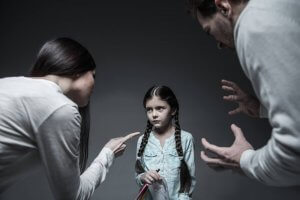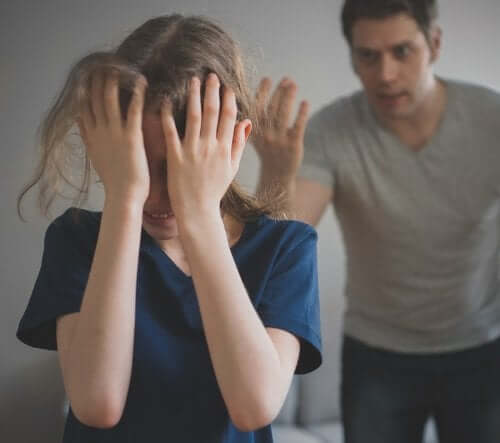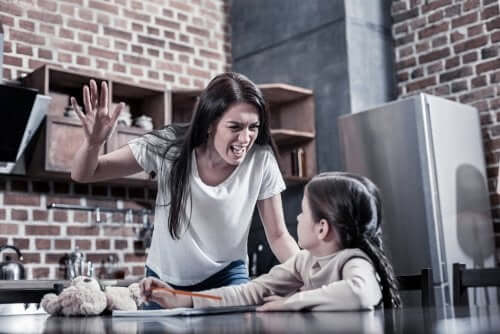5 Consequences of Humiliating Children

Children don’t come with an instruction manual, and there are certain situations that make parents feel overwhelmed. We all do what we consider best for our children, but it’s important that we take a minute to think about the consequences of our actions. Humiliating children is never the right answer.
The harmful effects of humiliating children
Humiliating children consists of belittling them, denying their dignity as human beings. This is a point that we should never forget: Our children are people. Even though they depend on us in many aspects, they’re not objects that we own. Therefore, we have no right to dishonor them or treat them without respect.
There are still many families today that resort to power and authority when it comes to raising their kids. Without a doubt, these adults receive the same type of upbringing from their own parents. They probably believe it’s important to discipline children and that this requires being firm, strict, and imposing a hierarchy.
When things get to be too much, parents may have a hard time controlling their impulses and end up humiliating their children, even though they know it’s wrong.

We need to keep in mind that these actions do nothing to educate our children. Rather, they’re simply a way that parents vent their lack of control over their emotions. Spankings and insults don’t teach children why what they’re doing is wrong. Nor do they teach them how to do things better. These kinds of punishments only produce feelings of helplessness and a lack of self-worth.
Put yourself in their shoes
The most effective way to comprehend the effects of humiliating children is to put ourselves in their shoes. Imagine if you spilled something in your house and your partner started screaming at you and belittling you… telling you how clumsy you are and that you can’t do anything right.
How would you feel? Imagine if you arrived late to work and, to teach you a lesson, your boss hit you? Would that be acceptable? Would you take away anything positive?
If we all understand that this is inadmissible among adults, then why do we think it’s a viable option for children? They feel the same shame, anger, and fear that we do. And they also find this lack of coherence confusing. They ask themselves why it’s okay for adults to scream, hit, and insult but it’s not okay for kids?
The consequences of humiliating children
- Education that’s based on power and authority doesn’t work in the long run. It may seem to be effective at the time because your children submit and obey. But, the truth is, they’re not really learning anything, and you’re not teaching them any values. What’s more, your humiliation will likely produce rebellion, anger, and a need for revenge.
- Your children will be more likely to humiliate others. You’re the number one role model for your kids, so your actions will teach them that humiliating others is okay. And they’ll use humiliation as a means for relating to others.
- Humiliating children destroys your relationship. When you criticize, yell at, and hurt your children on a regular basis, you destroy their trust in you and produce an emotional wound. Your children won’t see you as an ally or a confidant, but rather a source of pain.
- Humiliating children destroys their self-esteem. These actions cause children to have negative feelings about themselves. As a result, they feel incapable, unworthy, and of little value. They may feel paralyzed by certain situations and even develop anxiety and depression.

- Humiliating children creates self-fulfilled prophecies. If you’re constantly telling your children that they’re stupid, then they’re more likely to get bad grades. In the same way, if you tell them all the time that they’re clumsy, they’ll be much less likely to enjoy sports. The things you say to your children program their minds. If you tell kids they can’t do anything right, they’ll just stop trying.
Respect is the key
In conclusion, to raise healthy and happy children, we need to be respectful of them. Parents need to establish and uphold clear rules and values, of course. But if children disobey, we need to correct them calmly and lovingly.
Above all else, emphasize understanding why children behave the way they do and what they’re trying to tell you. Patiently and kindly explain why certain behavior is unacceptable and how you want them to behave. Focus on the positive and convince your children that they’re good, valuable, and capable. Engrave these ideas on their mind so clearly that they’ll never believe otherwise.
Children don’t come with an instruction manual, and there are certain situations that make parents feel overwhelmed. We all do what we consider best for our children, but it’s important that we take a minute to think about the consequences of our actions. Humiliating children is never the right answer.
The harmful effects of humiliating children
Humiliating children consists of belittling them, denying their dignity as human beings. This is a point that we should never forget: Our children are people. Even though they depend on us in many aspects, they’re not objects that we own. Therefore, we have no right to dishonor them or treat them without respect.
There are still many families today that resort to power and authority when it comes to raising their kids. Without a doubt, these adults receive the same type of upbringing from their own parents. They probably believe it’s important to discipline children and that this requires being firm, strict, and imposing a hierarchy.
When things get to be too much, parents may have a hard time controlling their impulses and end up humiliating their children, even though they know it’s wrong.

We need to keep in mind that these actions do nothing to educate our children. Rather, they’re simply a way that parents vent their lack of control over their emotions. Spankings and insults don’t teach children why what they’re doing is wrong. Nor do they teach them how to do things better. These kinds of punishments only produce feelings of helplessness and a lack of self-worth.
Put yourself in their shoes
The most effective way to comprehend the effects of humiliating children is to put ourselves in their shoes. Imagine if you spilled something in your house and your partner started screaming at you and belittling you… telling you how clumsy you are and that you can’t do anything right.
How would you feel? Imagine if you arrived late to work and, to teach you a lesson, your boss hit you? Would that be acceptable? Would you take away anything positive?
If we all understand that this is inadmissible among adults, then why do we think it’s a viable option for children? They feel the same shame, anger, and fear that we do. And they also find this lack of coherence confusing. They ask themselves why it’s okay for adults to scream, hit, and insult but it’s not okay for kids?
The consequences of humiliating children
- Education that’s based on power and authority doesn’t work in the long run. It may seem to be effective at the time because your children submit and obey. But, the truth is, they’re not really learning anything, and you’re not teaching them any values. What’s more, your humiliation will likely produce rebellion, anger, and a need for revenge.
- Your children will be more likely to humiliate others. You’re the number one role model for your kids, so your actions will teach them that humiliating others is okay. And they’ll use humiliation as a means for relating to others.
- Humiliating children destroys your relationship. When you criticize, yell at, and hurt your children on a regular basis, you destroy their trust in you and produce an emotional wound. Your children won’t see you as an ally or a confidant, but rather a source of pain.
- Humiliating children destroys their self-esteem. These actions cause children to have negative feelings about themselves. As a result, they feel incapable, unworthy, and of little value. They may feel paralyzed by certain situations and even develop anxiety and depression.

- Humiliating children creates self-fulfilled prophecies. If you’re constantly telling your children that they’re stupid, then they’re more likely to get bad grades. In the same way, if you tell them all the time that they’re clumsy, they’ll be much less likely to enjoy sports. The things you say to your children program their minds. If you tell kids they can’t do anything right, they’ll just stop trying.
Respect is the key
In conclusion, to raise healthy and happy children, we need to be respectful of them. Parents need to establish and uphold clear rules and values, of course. But if children disobey, we need to correct them calmly and lovingly.
Above all else, emphasize understanding why children behave the way they do and what they’re trying to tell you. Patiently and kindly explain why certain behavior is unacceptable and how you want them to behave. Focus on the positive and convince your children that they’re good, valuable, and capable. Engrave these ideas on their mind so clearly that they’ll never believe otherwise.
All cited sources were thoroughly reviewed by our team to ensure their quality, reliability, currency, and validity. The bibliography of this article was considered reliable and of academic or scientific accuracy.
- Mestre, M. V., Samper, P., Tur, A., & Díez, I. (2001). Estilos de crianza y desarrollo prosocial de los hijos. https://www.researchgate.net/publication/28177496_Estilos_de_crianza_y_desarrollo_prosocial_de_los_hijos
- Pérez, J. G., & Gil, A. H. (1986). La dignidad de la persona. Civitas.
This text is provided for informational purposes only and does not replace consultation with a professional. If in doubt, consult your specialist.








